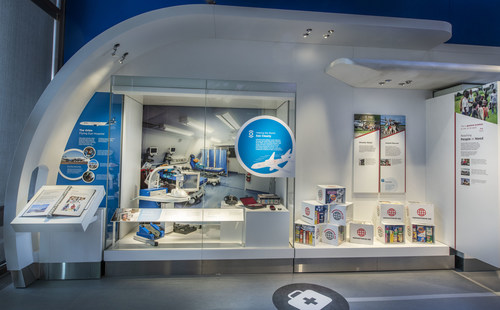#PatrioticPeachy #PilotPeachy #PeachyinSpace #HealthyPeachy @Smithsonian #Orbis Becomes Part of Aviation History at the Smithsonian's National Air and Space Museum
A new exhibit opens the day after World Sight Day, celebrated each year to focus the world's attention on the importance of eye care
On World Sight Day, eye care nonprofit Orbis International is pleased to announce the inclusion of artifacts from the second-generation Orbis Flying Eye Hospital DC-10 aircraft in a new permanent exhibition opening on Friday, October 14, 2022, at the Smithsonian's National Air and Space Museum in Washington, DC. An example of humanitarian flight that combines innovations in medicine and aviation, Orbis will be featured in the new "Thomas W. Haas We All Fly" exhibition, which celebrates the breadth and depth of general aviation and its deep impact on society.

Orbis International and its iconic Flying Eye Hospital are featured in a new gallery at the Smithsonian's National Air and Space Museum in Washington, DC. The Orbis exhibit includes a simulator used for training eye care professionals around the world in treating cataracts, the leading cause of blindness.
The exhibit will feature a simulator from the Flying Eye Hospital – the world's only fully accredited ophthalmic teaching hospital on board a plane – now currently in its third generation on an MD-10 aircraft. The simulator was used to train eye care professionals on cataract surgery, the leading cause of blindness in the world. Orbis has adopted simulation training, much in the same way that pilots learn to fly planes through simulation, to allow eye care teams to build their skills and confidence safely before progressing to real-life surgeries.
"From the earliest days of Orbis, we knew that bringing training from the world's best eye care professionals directly to the eye care teams who need it most would change the way the world sees," says Derek Hodkey, President & CEO of Orbis International. "It's what led to the launch of our Flying Eye Hospital exactly 40 years ago – making it an especially fitting time to look back on all the progress we've made. We are grateful to the National Air and Space Museum for shining this important spotlight on our work."
"The Orbis Flying Eye Hospital is a wonderful example of the use of general aviation for humanitarian purposes, something we wanted to highlight in the "Thomas W Haas We All Fly" gallery," said Dorothy Cochrane, National Air and Space Museum curator. "This is truly a unique way of reaching people in need."
Live Event
Orbis will join the museum's GE Aviation Lecture Series during a live conversation titled "The Flying Eye Hospital: Medicine Meets Aviation" on Thursday, November 17, 2022, at 8 p.m. EST. The event will be held at the museum's Steven F. Udvar-Hazy Center and also streamed online. The general public is invited to attend and learn about how aviation is increasing access to eye care in communities around the world.
During the conversation, Orbis's Vice President of Clinical Services and Technologies, Dr. Hunter Cherwek, and Director of Aircraft Operations and Maintenance, Bruce Johnson, will give an insider's view into what it is like to work on one of the world's most unique aircrafts and what is ahead for Orbis and its fight against avoidable blindness. The conversation will be moderated by Dorothy Cochrane, Curator of the Aeronautics Department at the Smithsonian Institution. The event is free to attend in-person or online, but registration is required here.
Forty Years of Innovation at Orbis
This year, Orbis is celebrating 40 years since the Flying Eye Hospital took its first flight. Since 1982, three generations of the Flying Eye Hospital have taken training to eye care teams in over 95 countries around the world. Orbis has continually harnessed the power of innovation to reach new heights in the fight against avoidable blindness.
Globally, 1.1 billion people live with vision loss, and 90% of cases are completely avoidable. Nine out of ten people with vision loss live in low- and middle-income countries, where quality eye care is often difficult, sometimes impossible, to access. An effective, lasting solution to this challenge is to ensure that eye care professionals in such countries can access quality ophthalmic training, building the skills they need to provide quality eye care to patients in their communities.
Over the past four decades, Orbis has conducted tens of millions of eye screenings and performed eye surgeries and laser treatments for hundreds of thousands of patients. Orbis has also trained hundreds of thousands of eye care professionals at all levels, including tens of thousands of medical doctors. The people Orbis trains go on to provide sight-saving care in their communities and, in many cases, go on to train eye care professionals themselves.
About Orbis
Orbis is a leading global non-governmental organization that has been a pioneer in the prevention and treatment of avoidable blindness for four decades. Orbis transforms lives by delivering the skills, resources and knowledge needed to deliver accessible quality eye care. Working in collaboration with local partners, including hospitals, universities, government agencies and ministries of health, Orbis provides hands-on ophthalmology training, strengthens healthcare infrastructure and advocates for the prioritization of eye health on public health agendas. Orbis operates the world's only Flying Eye Hospital, a fully accredited ophthalmic teaching hospital on board an MD-10 aircraft, and an award-winning telemedicine platform, Cybersight. For the past ten consecutive years, Orbis has achieved Charity Navigator's coveted four-star rating for demonstrating strong financial health and commitment to accountability and transparency, placing Orbis in the top 3% of U.S. charities. For the past two years, Orbis has earned GuideStar's platinum Seal of Transparency. In 2022, Orbis earned "accredited charity" status from the Better Business Bureau by meeting all 20 of their standards for charity accountability. To learn more, please visit orbis.org.



































































































